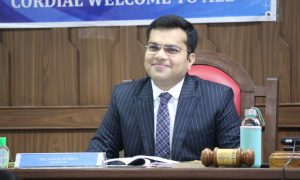Pearl Boga completed her B.Com degree from H.R. College of Commerce and Economics, Mumbai in 2007 and went on to study the three-year law course from University of Mumbai. She graduated in law in 2010. She was part of a number of committees and societies in college and after graduation, she also holds a Diploma in Tourism and Travel Management.
Pearl started working at Advani & Co., Mumbai in the corporate department of the firm. After four years at Advani, she currently works at Rajani Singhania & Associates and is also actively pursuing her masters in law from Mumbai University.
In this interview, she talks about:
- Pursuing LL.B after B.Com
- The advantages of being part of organisational work in law school
- Maintaining a work-life balance in the corporate sector.
- Work experience at Advani and Co.
- Appointment and work at RSP
Though it’s one of the most asked questions but yet, why law?
Well, to be absolutely honest, law was my back-up career option, post my graduation in commerce from H.R. College of Commerce and Economics. I was inclined towards travel and tourism and looking for an alternate degree. However, once my course was ending it seemed to be a lucrative career choice. So here I am!
Tell us about your college life. What all activities did you participate in?
College life was a mixed bag – from attending and participating in moots to participating in extra-curricular college activities andperforming arts and the jazz. My college life extended from my B.Com graduation to an Advanced Diploma in Tourism and Travel Management to a post -graduation degree in Law. I only happened to intern in my final (third) year of law.
What were your areas of interest during your graduation? How did you go about developing expertise and knowledge in these areas?
Initially, I was more interested in litigation and also interned at Vigil Juris in the litigation team. My work there involved a lot of reading of drafts of plaints and understanding the way the written statement was to be drawn. I gained a lot of experience seeing how the courts actually function as compared to simply reading about it. Also, interactions with the counsels helped me understand and be updated about the stage at which the matter currently was.
At Mumbai University, you were associated with a lot of student committees. What skills did you acquire while serving various committees?
During my graduation years, I was involved in extra-curricular activities like performing arts, moots and environment protection. Participating and preparing for moots usually helped me in the way I carry out research pertaining to my matters. Also, being a part of the organising as well as participating committee was a wonderful experience as it helped in building team spirit. This trait has proved to be very important now as being a part of a corporate M&A team, it is important to work with your team on a transaction and the same involves a lot of understanding on how your team mate works and the thought that goes behind the work put forth. It is much simpler to work when you know how the people in your team think!
How did you fare in your academics? Would you say a great CGPA is a necessity to kick-start a good career in the legal profession?
I was fairly above average in academics. To kick-start a career in any profession in India, I guess a good score is required. A great CGPA would definitely help securing decent internships during campus placements which would go a long way in determining the law firm you end up at.
Do you think participating in co-curricular activities helps a student in the long run?
Personally, I feel mooting does not help much if you are planning on taking up corporate law. However, it helps in developing certain skill sets which do help in your law career. Also, the research work undertaken in order to help you for a moot helps in understanding how one needs to prepare for a particular case. Mostly it is the recruiters’ discretion at the time of an interview to decide whether to lay emphasis on a particular candidate’s mooting experience depending on which legal field they are to be placed in.As I said before, my extra-curricular activity experience did help in building teamwork.
What kind of internships did you do while you were a student?
I only interned in my final (third) year of college at Vigil Juris in the litigation department and thereafter changed my field preference to corporate law.
After graduation, you joined Advani and Co. as an Associate. What did you contribute towards this appointment?
My main area of practise at Advani & Co. was corporate and commercial law. I was mainly involved in documentation for transactions pertaining to project finance, real estate, media and entertainment, intellectual property rights management. Further my scope of work included advising on miscellaneous issues relating to incorporation of companies, corporate governance, inbound and outbound investment, transactions related to equity market instruments, SEBI, etc. as well as conducting statutory compliance audit for various companies, specifically in relation to the labour laws as well as environmental laws and advising on the process for rectifying the lapses in compliances.
After having worked at Advani & Co. for almost four years, how did the shift to Rajani, Singhania and Associates take place? Did you get an offer or did you apply for RSP?
My experience at Advani & Co. was very fruitful; however I was looking for further exposure in the corporate field. The same being so diverse, I wanted to explore the other aspects of corporate law. So, when I got a call from RSP for an interview, I thought of taking the chance.
What does your current work profile at RSP consist of? Tell us about the nature of work you’re entrusted with therein and what’s a typical day like?
My current profile at RSP mainly involves a lot of M&A transactional work in varied sectors from the due diligence to the documentation, negotiation and finalisation of the deal stage. My scope of work also involves advising clients for drawing up schemes of arrangements for corporate restructuring, advising on issues relating foreign investment, corporate governance, etc.
A typical day usually consists of reading emails received from the clients, having a team discussion pertaining to the same and allocation of the day’s work to the respective team members.
Corporate law comes with a humongous workload. What made you gravitate towards this field? How do you manage the workload and your personal life?
A good balance is always essential for any healthy relationship. Prioritising your work and personal life in a balanced manner is a very important attribute one needs to possess in order to not get stressed out. I usually have self made targets and checklists for the work I need to complete. Whenever there is time for a breather between my work, I usually cut-off and have a small conversation over the phone or interact with my colleagues.
What would be the one misconception you’d say you’d always held about real life legal work till the time you were an intern but changed once you started working as a lawyer?
Whilst doing my internship I was assigned with very limited responsibilities. That definitely changes once you start working full fledged. You have to take responsibility for your work, for your juniors, working with a team or even working independently. It involves taking a lot of onus for the work you put forth and there is generally no scope for error.
Would you say your B.Com degree has been helpful in your career?
My B.Com degree has definitely helped me. Especially when it relates to conducting due diligence for M&A transactions, the review of a lot of the financial documents is much easier since I have a background in accounts. Also, my B.Com course had contract law as a subject which made it relatively easier for me to study the same for my law degree.
RSP takes on interns as well. What do you feel makes an intern stand out and is very important for him to do to have a chance of getting a call back or even a PPO?
A very important quality for an intern is to have impeccable research and drafting skills. Also a pro-active and go getter attitude would help them go a long way in the legal field.
What skills would you say is a sine qua non for an intern who wants to excel at work?
An important ingredient for an intern to excel would be to remain focussed and complete their work within the time frame provided in the manner and with the quality expected from them. Also their work needs to be backed by solid accurate research and they should be updated with the current changes taking place in law.
Where do you see yourself five years from now?
I am currently pursuing my LL.M (Master of Laws) in Business Law from Mumbai University along with my work. As I have only finished 5 years of my experience in this field, I would want to continue in the same space for the next few years to gather more expertise in this varied field of corporate law since there is so much more to learn.
Lastly, what would be your parting message for our readers?
I would like to say stay focussed, follow your dream, have a passion and pursue it (be it law or otherwise). The more you like what you do, the more you enjoy doing it. Make your career choice your passion and there will be no looking back J

























